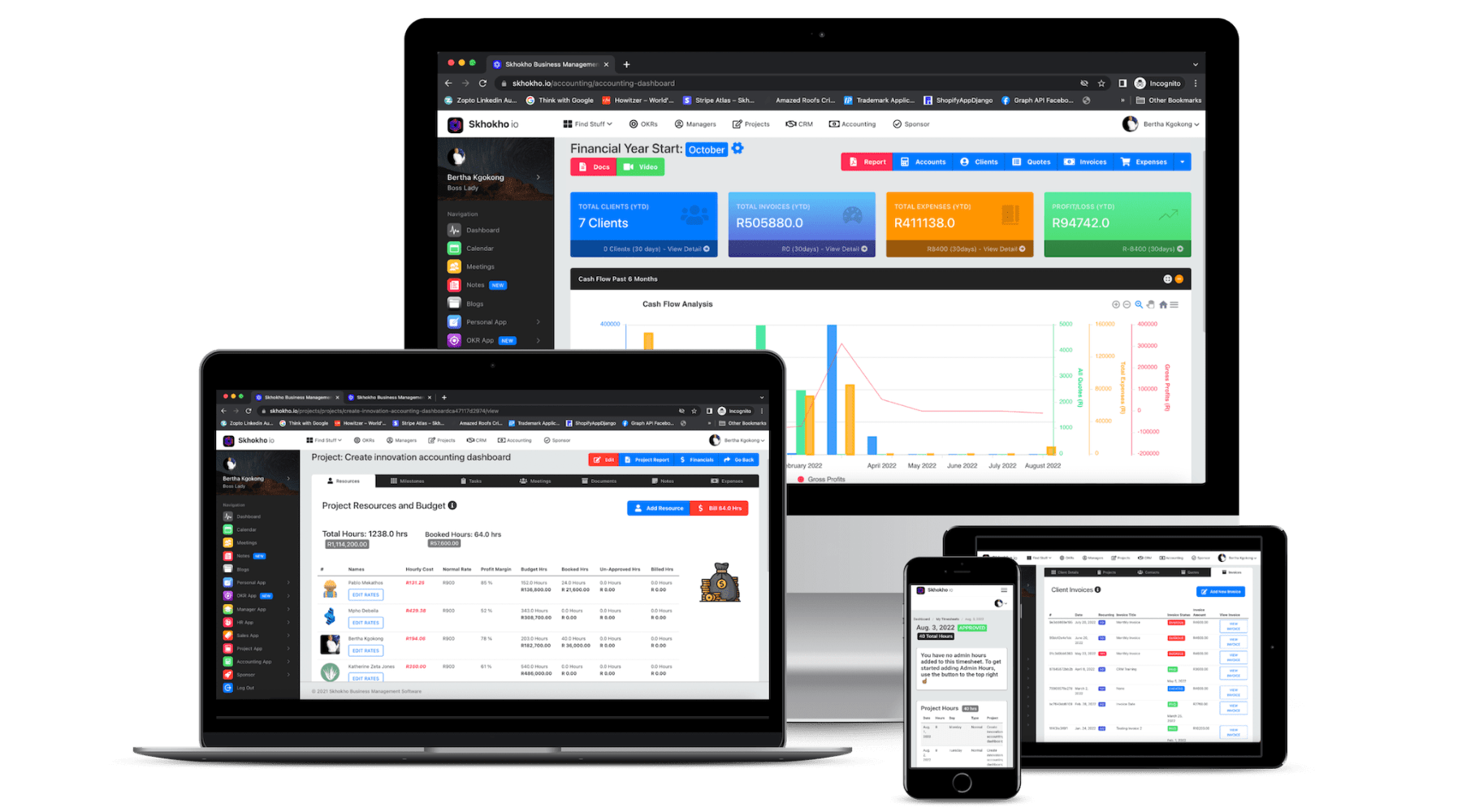Why IoT and Business Intelligence Are Essential for SMEs
The Internet of Things (IoT) and business intelligence are two important technologies that are transforming the way businesses operate. While these technologies are often associated with large enterprises, they are also becoming increasingly essential for small and medium-sized enterprises (SMEs). By leveraging IoT and business intelligence, SMEs can improve productivity and efficiency, streamline operations, gain a competitive edge, and make better-informed decisions. In today's fast-paced and data-driven business landscape, it is becoming increasingly important for SMEs to explore and implement these technologies in order to build a compelling business case, stay competitive and successful.

On this article, we will focus on the following:
- What is IoT in the world of SMEs
- The benefits of IoT for SMEs
- What is Business Intelligence
- The Benefits of Business Intelligence for SMEs
- How can Skhokho Business Management Software Help SMEs become more efficient?
What is IoT in the world of SMEs: IoT Technologies
The Internet of Things (IoT) refers to the interconnected devices via network, vehicles, and other objects that are equipped with sensors and software, allowing them to collect and exchange data. Here are a few examples of how small and medium-sized enterprises (SMEs) can use IoT technologies to improve their operations:
IoT Technology:
- Inventory management: Adopting IoT sensors and tracking devices to monitor inventory levels in real-time, can help SMEs to optimize their supply chain and reduce waste.
- Asset tracking: SMEs can use an IoT device to track and monitor the location and performance of their assets, such as vehicles, equipment, and machinery. This can help them to reduce predictive maintenance costs and improve company efficiency.
- Customer relationship management: Implementing IoT devices to collect data on customer behavior and preferences can help SMEs tailor their products and services to meet customer needs.
- Supply chain management: IoT can help SMEs optimize their supply chain by tracking the movement of goods, monitoring performance, and identifying bottlenecks.
- Production optimization: SMEs can use IoT sensors to monitor and track production processes in real-time, helping them to identify inefficiencies and optimize performance.
The use of innovative technology can help SMEs to improve efficiency, cutting costs, and enhance their customer relationships by collecting and analyzing data from connected devices.
The benefits of IoT for businesses / SMEs: The Importance of IoT in business
There are several benefits of IoT for small and medium-sized enterprises (SMEs). Here are a few examples:
1. Increased efficiency and cost savings:
IoT implementation can help SMEs streamline their organizational processes and reduce costs by automating tasks, optimising resources, and reducing waste. For example, an SME might use IoT sensors to monitor equipment performance and maintenance needs, or to track inventory levels in real-time. They can also use CRMs to help with managing their day-to-day operations to guarantee a smooth running of the business and improve productivity. This can help the business save time, money, and resources. Increased revenue could be achieved in this way.

2. Improved data collection and analysis:
IoT devices generate a large amount of data, which can be analyzed to gain insights into the business. This can help SMEs identify trends, optimize processes, and make better-informed decisions.
3. Enhanced customer service & experiences:
IoT can be used to improve customer experiences in a variety of ways. For example, a small retailer might use IoT sensors to track inventory levels and enable customers to order products online, or a small manufacturer might use IoT to monitor products and track orders in real-time.
Overall, the use of IoT can help SMEs become more efficient, adaptable, and competitive in today's business environment.
What is Business Intelligence
Business intelligence refers to the tools and techniques used to analyze and interpret data in order to inform decision-making and strategy. Here are a few examples of business intelligence tools and techniques:

- Data visualization: This refers to the use of charts, graphs, and other visual aids to help companies understand and interpret data. Visualization tools can be used to create dashboards, reports, and other visualizations that help companies make sense of complex data sets and new insights.
- Data mining: This refers to the process of using algorithms to extract patterns and insights from large data sets. Data mining tools can be used to identify trends, predict outcomes, and make recommendations based on data.
- Business analytics: This refers to the use of statistical and mathematical techniques to analyze data and make predictions about future trends and outcomes. Advanced analytics tools can be used to identify patterns, optimize processes, and improve decision-making.
- Reporting and dashboarding: Business intelligence tools can be used to create reports and dashboards that provide real-time insights into business operations. These tools can be used to track Objective Key Results(OKRs), identify trends, and monitor progress.
- Predictive analytics: This refers to the use of statistical models and machine learning algorithms to predict future outcomes based on data. Predictive analytics tools can be used to forecast demand, identify potential risks, and make recommendations for future action.
Business intelligence tools and techniques are used to help businesses make more informed decisions and optimize their operations based on data.
The Benefits of Business Intelligence for SMEs
Business intelligence has a huge impact in small and medium-sized enterprises (SMEs). Here are a few examples:
1. Access to real-time data and insights:
These tools allow SMEs to access and analyze large amounts of data in real-time. This can help them make quicker and more accurate decisions, and respond more quickly to changes in the market.
2. Improved decision-making and strategic planning:
By using business intelligence to analyze data and identify trends, SMEs can make more informed decisions about their business strategies and plans. This can help them stay ahead of the competition and better meet the needs of their customers.

3. Enhanced competitiveness:
By using these tools to gain insights into their operations and the market, SMEs can gain a competitive edge over their rivals. This can help them adapt to changing customer needs and stay ahead of the competition.
4. Increased efficiency and cost savings:
Business intelligence can help SMEs optimize their operations and identify opportunities for cost savings. For example, an SME might use business intelligence to analyze production processes and identify areas for improvement, or to track customer behavior and identify new sales opportunities.
Business intelligence can help SMEs to become more efficient, adaptable, and competitive in today's business environment.
How can Skhokho Business Management Software Help SMEs become more efficient?
Skhokho Business management software can help small and medium-sized enterprises (SMEs) become more efficient in a number of ways. Here are a few examples:
* Automating time consuming tasks:
Business management software can automate a range of repetitive tasks, such as invoicing, payroll, and customer relationship management to enhance customer satisfaction. This can save time and reduce the risk of errors, freeing up SME staff to focus on more value-added activities.
* Streamlining operations:
Business management software can help SMEs streamline their operations by integrating various business processes and systems into a single platform. This can improve communication, easy remote monitoring, reduce duplication of effort, and eliminate bottlenecks.
* Improving decision-making:
Business management software can provide real-time insights into business operations, helping SMEs to make more informed decisions and respond more quickly to changes in the market.
* Enhancing collaboration:
Business management software can facilitate collaboration between team members and improve communication across departments. This can result in improved productivity and efficiency.
* Reducing costs:
By automating tasks and streamlining operations, business management software can help SMEs reduce their costs and improve their bottom line.
Business management software can be a valuable tool for SMEs looking to improve efficiency and drive growth.

Skhokho contains the following app:
- Project Management App
- Sales and CRM App
- HR Management App
- Manager App
- Accounting App
- OKR App
- Notes App
- Meetings App
All this apps are fully integrated into one software, making it easy to find the information that you need in one place. Skhokho also offers a 14 day free trial without you providing any card information.
For more information on how Skhokho, click here. Skhokho provides a user guide, to view it, click here: https://skhokho.io/documentation/guide/
To get started, just click here and create an account, take full advantage of the 14 day free trial.
Conclusion
The Internet of Things and business intelligence are two important technologies that can bring a range of benefits to small businesses and medium-sized enterprises (SMEs). Overall, IoT and business artificial intelligence can help SMEs to become more efficient, adaptable, and competitive in today's fast-paced business environment.
Many businesses that are looking to stay competitive in today's market should consider exploring and implementing the technologies of the Internet of Things and business intelligence. These technologies can bring a range of benefits to many SMEs, including increased efficiency and cutting costs, improved decision-making and strategic planning, enhanced competitiveness, and improved data collection and analysis.
The adoption of IoT and business intelligence can also help SMEs to stay ahead of the competition and adapt to changing customer needs and improve customer experience in today's fast-paced business environment. While implementing these technologies may require an initial investment, the long-term benefits can far outweigh the costs.
SMEs that are interested in exploring these technologies should consider reaching out to industry experts and vendors for guidance on how to get started. There are also a range of resources available online, such as blogs, articles, and case studies, that can provide valuable insights and inspiration.
Overall, the adoption of IoT and business intelligence can be a powerful way for SMEs to drive innovation, improve efficiency, and stay competitive in today's market.









